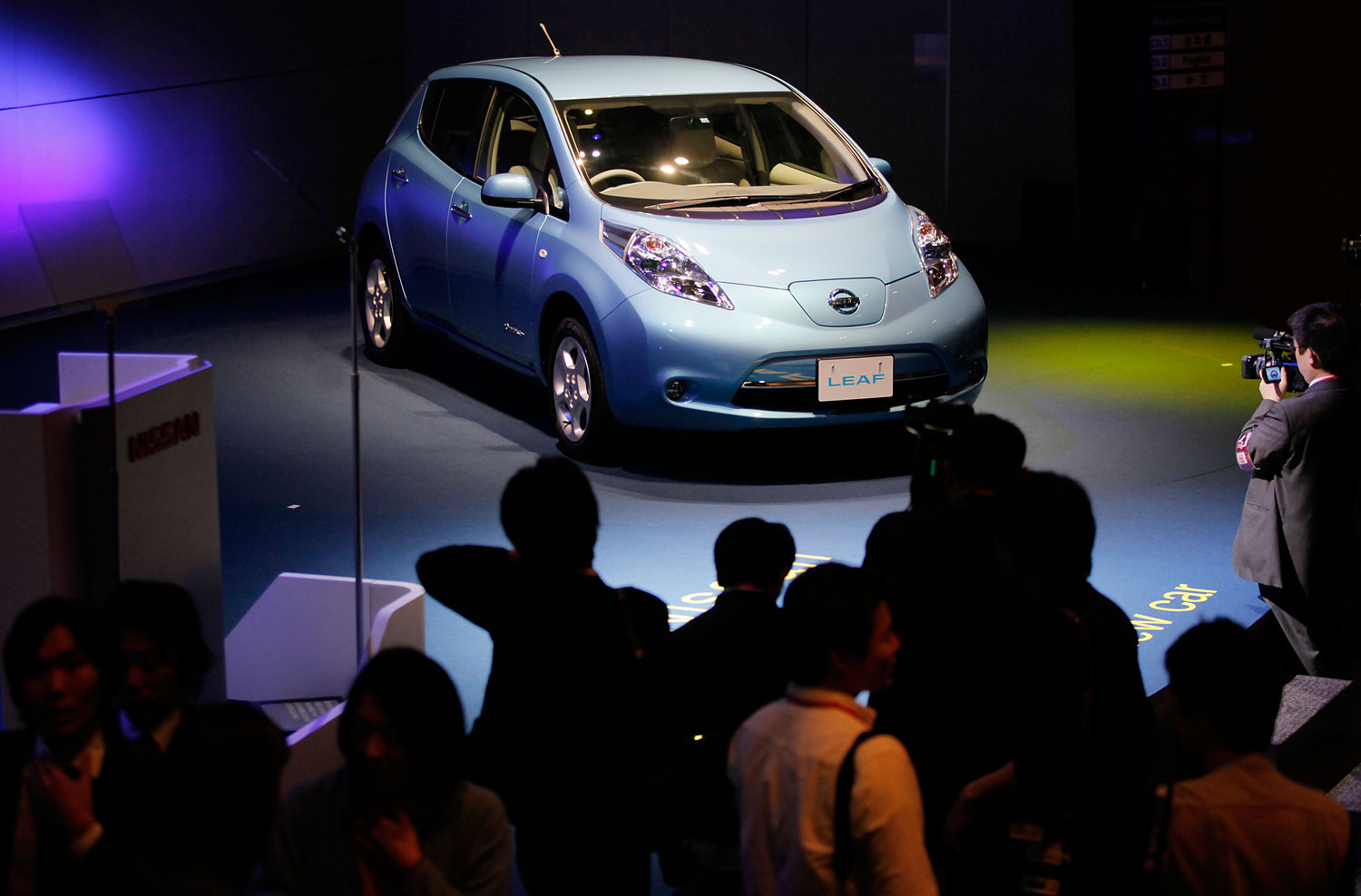
Everybody understands that one big upside of owning an electric car is that you’ll never have to spend a penny on gasoline. Now, you won’t have to pay for the electricity needed to charge the car either.
Thanks to a new “No Charge to Charge” initiative from Nissan, drivers who purchase or lease a new battery-powered Nissan Leaf will receive a special card that allows them to plug in at public charging stations at no cost whatsoever starting July 1. The program will be available in 25 U.S. markets, which have collectively accounted for 80% of all Leaf purchases thus far, and owners will be able to charge their vehicles for free for two years. Anyone who purchases outright or leases a new Leaf as of April 1 or later is eligible in the participating markets, which include many major cities along the West Coast, as well as Nashville, Houston, and Washington, D.C.
According to the U.S. Department of Energy’s FuelEconomy.gov site, a Nissan Leaf owner can expect to pay an average of $550 in “fuel cost” annually, based on driving 15,000 miles per year. So Nissan’s program would seem to be the equivalent of a $1,100 bonus for buyers. Whether or not an owner actually realizes such a return will depend a lot on how easy it is to use the public charging stations where plugging in is free. Most electric car owners charge their vehicles at home at night, and Nissan isn’t going to pitch in with any portion of your house’s electricity bill.
Even if “No Charge to Charge” offers less of a return that it initially seems like at first glance, the program obviously makes it more enticing—and more cost-effective—to buy a Leaf, so it could push some potential buyers off the fence. “The net effect here is it really increases the utility of the Leaf for the driver,” Norman Hajjar, research director for the electric-car app creator Recargo, said of Nissan’s new initiative, via the San Francisco Chronicle.
Nissan’s move comes at a muddled time in the electric car market, when Tesla is clearly the runaway success at the high end of the field, and when a wide range of less expensive EVs, plug-ins, and hybrids continue to vie for consumer attention. Despite the arrival of more and more plug-in models into the market, hybrids and electric cars remain a very small niche, representing around 3% of new car sales.
In a statement that’s about as definitive as you can get, Michelle Krebs, senior analyst with Edmunds.com, told the Detroit Free Press, “Plug-in vehicles aren’t going away, but how many will sell, at what price and using which technology, is yet to be determined.”
The Nissan Leaf ended 2013 on a high note, with its best sales month ever in December: 2,529 units sold, bringing the year’s total to 22,610, more than double the amount in 2012. But the disappearance of end-of-year incentives, combined with brutally cold weather that hurt all auto sales, resulted in a big electric car sale slump in early 2014. According to MarketWatch, there were 918 Chevy Volts and 1,252 Nissan Leafs sold in January 2014, compared to 2,392 Volts and 2,529 Leafs the previous month.
Leaf sales have rebounded with the onset of warmer weather, including 2,507 units sold in March, its second-best month ever, and a 12% increase over March 2013. For the first three months of 2014, meanwhile, sales of the gas-electric hybrid Volt decreased by 15% compared to the same period in 2013.
In any event, it’s clear that for any plug-in to achieve true mainstream appeal, some work needs to be done to convince the average driver of the cost-effectiveness of an electric car. Basically, the cars need to be cheaper to own and operate, or automakers need to do a better job of proving to consumers that these vehicles are indeed cheap to own and operate.
Throwing in two years’ worth of free charging, as Nissan is doing, certainly helps the equation. So does the tried-but-true practice of simply lowering the retail price. That’s what Nissan did in early 2013, which resulted in the automaker selling twice as many Leafs in 2013 that it did the previous year. And that’s what GM is planning for the next Chevy Volt, with the recent news that an entry-level Volt should hit the market for the 2016 model year with a list price starting at around $30,000—roughly $10,000 less than the base price of the original Volt.
More Must-Reads From TIME
- The 100 Most Influential People of 2024
- Coco Gauff Is Playing for Herself Now
- Scenes From Pro-Palestinian Encampments Across U.S. Universities
- 6 Compliments That Land Every Time
- If You're Dating Right Now , You're Brave: Column
- The AI That Could Heal a Divided Internet
- Fallout Is a Brilliant Model for the Future of Video Game Adaptations
- Want Weekly Recs on What to Watch, Read, and More? Sign Up for Worth Your Time
Contact us at letters@time.com